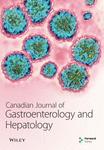Should Albumin Be Used in All Patients with Spontaneous Bacterial Peritonitis?
Abstract
Patients with cirrhosis who develop spontaneous bacterial peritonitis (SBP) have been reported to experience a high incidence of renal impairment and mortality. Renal dysfunction is possibly related to altered systemic hemodynamics that leads to decreased effective arterial blood volume. Albumin, a plasma volume expander, has been investigated to determine whether it plays a role in patients with SBP. The current literature suggests that albumin can reduce renal impairment and mortality in high-risk SBP patients, defined as patients with a serum bilirubin level of greater than 68.4 μmol/L, a blood urea nitrogen level of greater than 10.7 mmol/L or a serum creatinine level greater than 88.4 μmol/L. The rationale for albumin and other volume expanders in SBP is discussed, accompanied by a review of the current literature.




